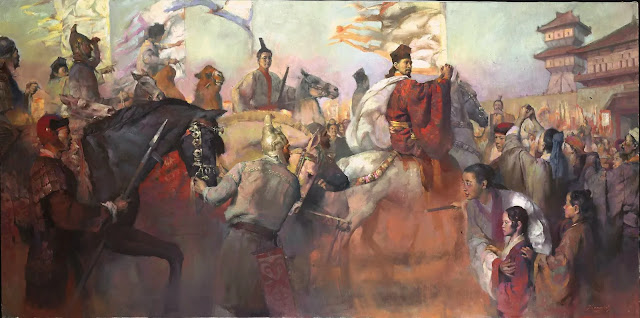Regarded as one of the most important figures in the history of the Silk Road, Zhang Qian was a diplomat and politician in the service of Emperor Wu. At the time, two powerful empires were emerging: Rome in the West and China in the East. While China was expanding westwards, seeking to establish commercial ties with distant lands, it was regularly raided by nomadic tribes, especially the Xiongnu, who controlled Central Asia.
To deal with this threat, the Chinese decided to strengthen their military by acquiring better horses. At the time, they only had small, pony-like horses unsuitable for carrying soldiers in armour. The "heavenly horses", larger and stronger, were said to come from the distant valleys of Fergana, located beyond the Tianshan Mountains, in what is now Uzbekistan and Kyrgyzstan. These horses were perfect for battle, and the Chinese needed them to defend against raids and improve their military power. This quest would lead to one of the most important journeys in Chinese history.
Around 138 BCE, the emperor sent an expedition to find these "heavenly horses". The envoy, led by Zhang Qian, set off with 100 men, including Ganfu, a captured native Xiongnu. Travelling to the western end of the Great Wall of China, Zhang continued toward the infamous Taklamakan Desert, knowing very well that he would have to pass through Xiongnu territory. It wasn't long before he was caught and spent ten years as a prisoner. During this time, he married a Xiongnu woman and had a child, but he never wavered from his mission, one that no other Chinese dignitary was willing to undertake. By this stage, the emperor had already presumed him dead. As oversight eased, Zhang fled, and instead of returning home, he continued until he reached the court of the Yuezhi in 129 BCE.
Hoping to negotiate an alliance, Zhang remained in Yuezhi for a year. Unable to persuade the chief, he left for China, only to be captured again by the Xiongnu. With civil war breaking out and the death of the shanyu (Xiongnu leader), Zhang seized the opportunity to escape a year later. This time, he returned with his family and the loyal Ganfu, the only other person to make it back to the Han court.
Although his mission was unsuccessful, he returned with valuable information. During his time with the Xiongnu, Zhang gained extensive knowledge of the Central Asian landscape, as well as the customs and politics of the Xiongnu and other nomadic tribes. He confirmed the existence of the "heavenly horses" in Fergana and, more importantly, introduced the idea of trade with the West by sharing stories about distant empires like Persia and India. While trade routes to the West had existed for centuries, Zhang's journey paved the way for the Silk Road, opening up trade between China and the West.










No comments:
Post a Comment
It's so good to see you here . . .